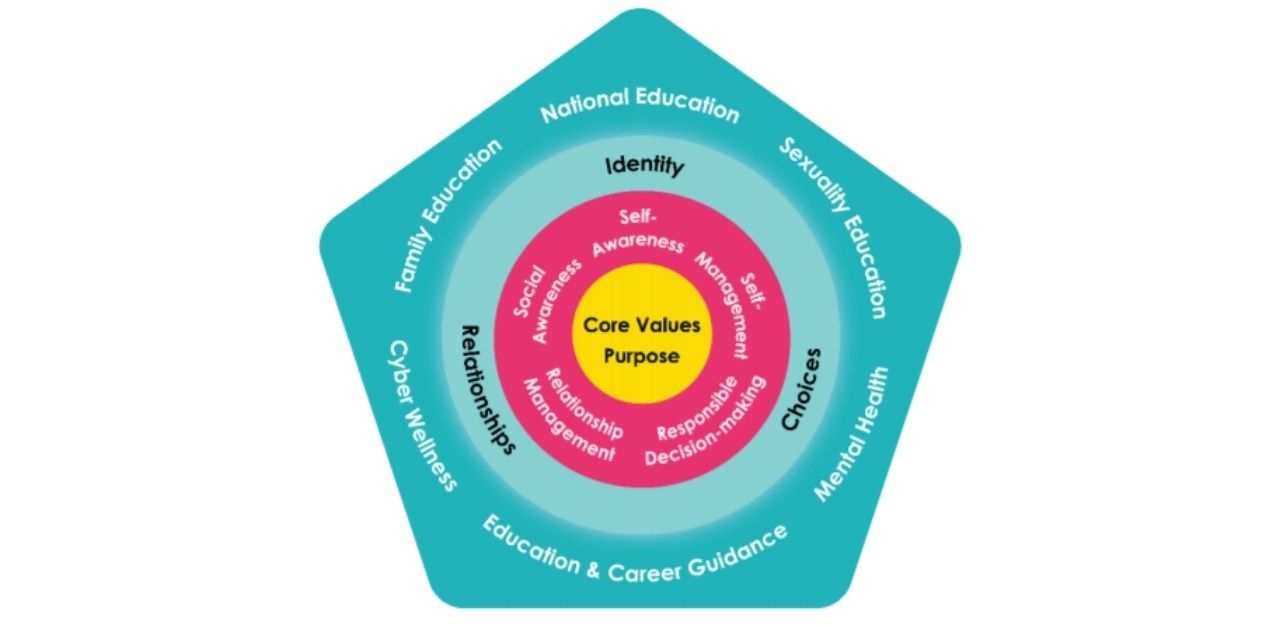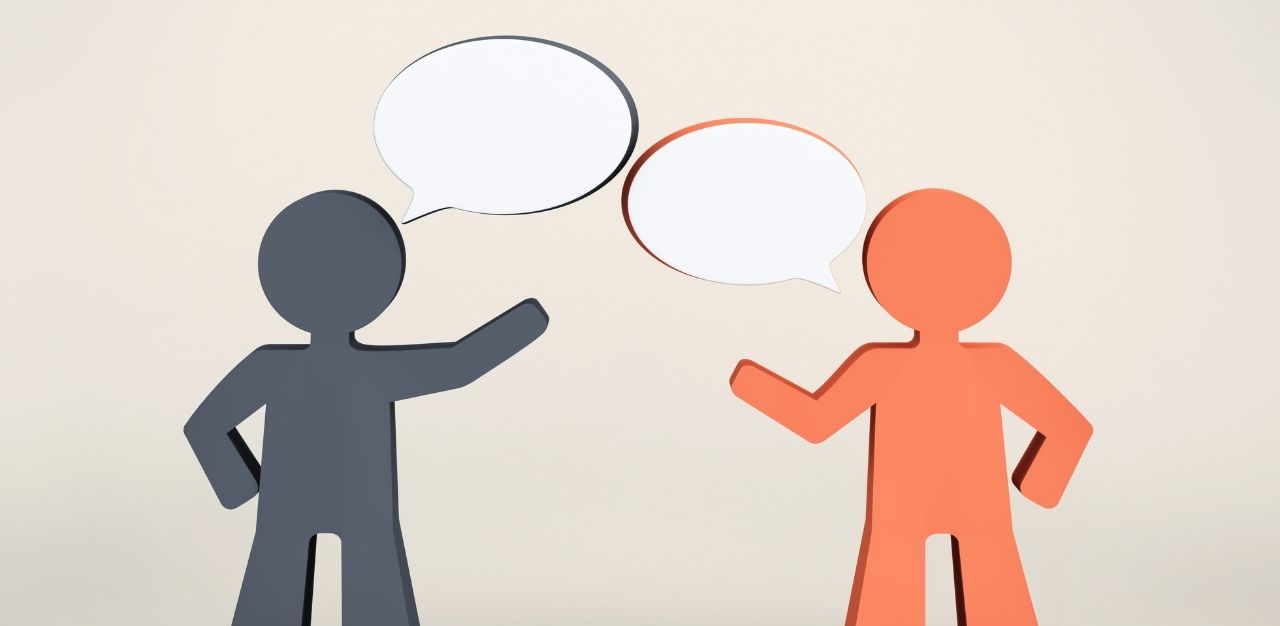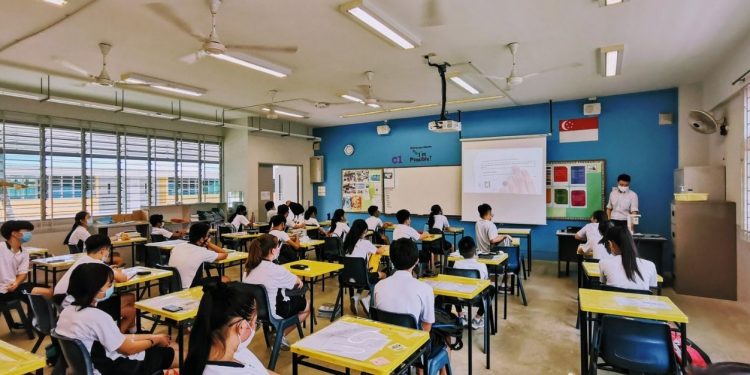When news first broke of the tragedy at River Valley High School on 19 July, the nation was shaken to its core. In the days that followed, words of support and encouragement were offered, feelings were processed, and conversations sparked. Many raised concerns about the need for more resources and mental health support in schools, including President Halimah Yacob and the alumni of River Valley High School.
But while the recent incident has shone a spotlight on the need to safeguard the mental well-being of students, mental health struggles among students have been a longstanding concern.
Michelle Koay, a High School Counsellor at St. Joseph’s Institution International, observes an increasing trend of depression and anxiety among students over the years.
She opines that several factors contribute to this: academic stress from parents, the school, peers, and society; the need to juggle a range of activities beyond academics, such as extra-curricular activities; a lack of focus on well-being; an emphasis on schoolwork and academia over building life skills; and increasing disconnect and isolation from the community due to a rise in online engagement, or parents being busy with work.
Current mental health measures in schools
In his parliamentary statement on 27 July, Minister of Education Chan Chun Sing touched on current measures to support the mental health of students in schools.
He explains: “Social emotional skills and resilience building form the foundation of MOE’s [Ministry of Education] mental health efforts, and have been part of our character and citizenship education or CCE curriculum for some time.”
He highlighted existing mental health support measures in schools, including the revised CCE curriculum implemented this year. This comprises enhanced features to develop mental health literacy in students, the implementation of peer support systems, the role of teachers in keeping an eye on their students, and the availability of school counsellors and teacher-counsellors – a special group of teachers who have received additional training to help students manage challenging social emotional problems.

But students believe that these measures are still inadequate.
Janet (not her real name), 19, who graduated from junior college in 2020, feels that CCE lessons do not place sufficient focus on mental health. She recounts: “Mental health management was not a focus we had in any of the lessons, or they were just briefly mentioned.”
Meanwhile, Ackley Tan, 17, who just graduated from secondary school, recalls that his school had events like mental health week and talks on mental health issues by external speakers. He believes that these are helpful for those who “experience issues, but are not sure what they are feeling” as it gives them an understanding of how they should help themselves.
However, like Janet, he feels that there is “not enough emphasis on mental health for students”. He elaborates: “They’ll just say, talk to a friend or teacher if you need help, but no one really asks how you are doing.”
Ms Koay opines: “I feel that the main problem is the delivery of the messages. We treat mental health literacy like a subject to be taught and learnt, and maybe even to be quizzed. We forget that mental health literacy is about how we live our lives, how we take care of ourselves, treat one another, and look after one another in the community.”
Her sentiments are echoed by Alan (not his real name), a teacher at a local junior college. He shares that while CCE lessons often cover self-management tools such as prioritising and managing stress, their effectiveness depends on students’ mentality. “The quality and outcome depend a lot on… how seriously they take it and whether they continue to practice it even as we remind them to,” he said.
“It is really tough for one teacher managing between 20 to 35 students (depending on which level we teach) to make sure that everyone is engaged and internalising [the lessons]… While each school tries to tailor the content to suit their school, and each tutor tweaks it to suit their class, it’s still really hard to ensure everyone takes it seriously,” he adds.
Acknowledging the need to further bolster mental health efforts in schools, Mr Chan introduced several “near-term” measures MOE intends to undertake:
But are these initiatives truly sufficient in Singapore’s pressure cooker environment? Will their execution place undue stress on teachers, who may already be working 52 to 56 hours a week? And beyond the near term, how can mental health support continue to be enhanced in the long term for students?
A step in the right direction, but not the end-all, be-all
Students Janet and Ackley welcome the new measures.
Janet says: “[These measures will] better equip teachers with more relevant knowledge on the different aspects of mental health and how to help or support students who may have mental health issues.”
Ackley adds that the measures will also help students who are struggling be identified more quickly, which allows for intervention in a prompt manner.
However, teachers and counsellors TheHomeGround Asia spoke to were a more cautious in their optimism. For instance, Athena (not her real name), a teacher at a secondary school, believes that improving the general mental health literacy of teachers is a good move but points out that the measures’ effectiveness is still dependent on the content of these additional courses.
“The initiatives are good, better than before, for sure,” Ms Koay says. “But we need to make sure that the human element is present. If we just go through the motions and do things as if we are checking the boxes, nothing will change. We have to genuinely want to care for one another.”
She adds: “I think it would be good to do a needs analysis with the teachers and students so it is not just a top down approach but also bottom up. Then, we can hear from the people who are involved, instead of just policy-makers who are not on the ground.”
Doctoral Candidate, Mental Health Advocate and Mental Health Researcher, Jonathan Kuek, agrees: “It would be good if we could make an intentional effort to include teachers and students who do not often provide input, and learn more about their needs and wants, so that solutions can be more representative of the entire schooling population.”
“Uncomfortable conversations will need to be had in order for things to progress,” he says.

There is also concern that such measures may place unnecessary pressure on teachers to be responsible for the well-being of their students. In particular, mandating that teachers check in on their students regularly is a point of contention for Athena.
“I find this a very tokenistic measure,” she rues. “It is difficult to find time and space to talk to every student within two terms, let alone one… It doesn’t have to be a blanket rule that we have to talk to, and record down, how a student is doing, just so it seems we have done our part as form teachers.”
Alan chimes in, sharing that oftentimes, a hurdle in addressing the mental health concerns of students is their own “self-censure”: “It takes a lot of trust to talk to an adult figure about their [students’] situation, especially if it involves more than just them.”
He thus believes that while measures like increasing the number of teacher-counsellors is promising, a lot of the initial groundwork will still fall to the teacher, to establish trust and a safe environment for students to be comfortable with sharing.
Being mindful of a teacher’s role
All the interviewees TheHomeGround Asia spoke to agree that teachers should play a role in managing the well-being of students.
Ms Koay suggests: “The teachers should be our first line of defence and should know how to administer mental health “first-aid”, but they should not bear the responsibility entirely because this is not what they are trained for.”
“It is really how the teachers need to be as teachers, not about the knowledge of mental health,” she elaborates. “Do the teachers nurture the students to grow and be the best that they can be? Are [they] able to see that when the students misbehave, there may be underlying mental health concerns, family issues or learning needs, and be more understanding and communicate positively and constructively towards them?”
“Some teachers take to the traditional ways of disciplining, like scolding or shouting at students, or mete out detentions which may not facilitate learning and growth in terms of character and life skills,” she observes.
The introduction of mental health support measures in schools should therefore take into account teachers’ capacities and well-being as well, according to Mr Kuek.
He says: “Every teacher has their unique personality and capacity for processing of ;emotional and behavioural cues, so if it places too great a burden on them, then it [the measures] may become a tokenistic effort.”
For instance, he highlights how measures like improving mental health literacy for teachers can be a double-edged sword: “There is no harm in having more knowledge… [but another] consideration is whether these extra development courses will place a significant burden on them, and what is expected from them once they receive an enhanced curriculum.”
Alan concurs, saying that while teachers may be responsible, it needs to be “within limits”.
“We have to wear a lot of hats,” he explains. Besides their core role of teaching, some teachers also double up as CCA coaches, carry out administrative and/or financial management for CCAs and committees, and act as event planners.

“On top of which we also have to be personal coaches or provide guidance and counselling for students. Such guidance is a thoroughly time consuming and emotionally wearing experience,” he says. “Please understand that many teachers are themselves also people with families and have to take care of them too.”
“If you are a parent to one or two children, [you understand] how much it takes to care for several adolescents/youths on a daily basis… It is definitely not the same, but you get how much we have to pour in in order to make a difference.”
A holistic approach to mental health support for students
As the saying goes, it takes a village to raise a child; supporting students’ mental health needs is no different.
Janet says: “I believe both teachers and parents have a role and responsibility for the mental well-being of students. As people who the students look up to and rely on, [they] should play their part in ensuring the mental health of students.”
She continues: “Even if the teachers and parents don’t necessarily understand or relate to how the students feel, they should be there with them and stand by them every step of the way.”
Mr Kuek chimes in: “I don’t think that teachers, while serving as one possible line of defence, should bear the entire weight of being the sole gatekeepers for students, especially given their existing workloads. This responsibility needs to be shared among all parties involved in a child’s or youth’s life.”
Students themselves are hoping for more conversations and understanding on issues surrounding mental health. Janet expresses her wish for more conversations on the topic, suggesting lessons on the topic of mental health, or even conducting discussions and forums to foster greater engagement on the topic.

Meanwhile, Ackley expounds the importance of taking mental health seriously: “Mental health issues should not be treated as a joke. People always say stuff like, ‘Why have depression? Just be happy.’ [This can be] offensive to many people since you really don’t know what’s happening behind the scenes.”
Ultimately, Ms Koay suggests that safeguarding the mental health of students is a systemic concern, and should be addressed as such: “We need to take a look at what needs to be done upstream, education and preventive work.”
“[Having] a less stressful education system, maintaining a healthy lifestyle, having time to connect and have fun with one another, stronger families, a caring community of teachers and peers, positive communication and more meaningful conversations,” she says.
Resources and helplines if you need support
If you are, or someone you know is struggling, or just need someone to talk to, resources are available:
- Care Corner Counselling: 1800 353 5800 (Mandarin)
- CHAT webCHAT Service
- Fei Yue’s Online Counselling Service
- Institute of Mental Health’s Mental Health Helpline: 6389-2222
- I’m Friendly Co Telegram Bot (for anonymous peer support)
- National Care Hotline: 1800-202-6868
- Singapore Association for Mental Health: 1800-283-7019
- Samaritans of Singapore: 1800-221-4444
- Silver Ribbon Singapore : 6385 3714
- TOUCHline: 1800 377 2252
Join the conversations on TheHomeGround Asia’s Facebook and Instagram, and get the latest updates via Telegram.














